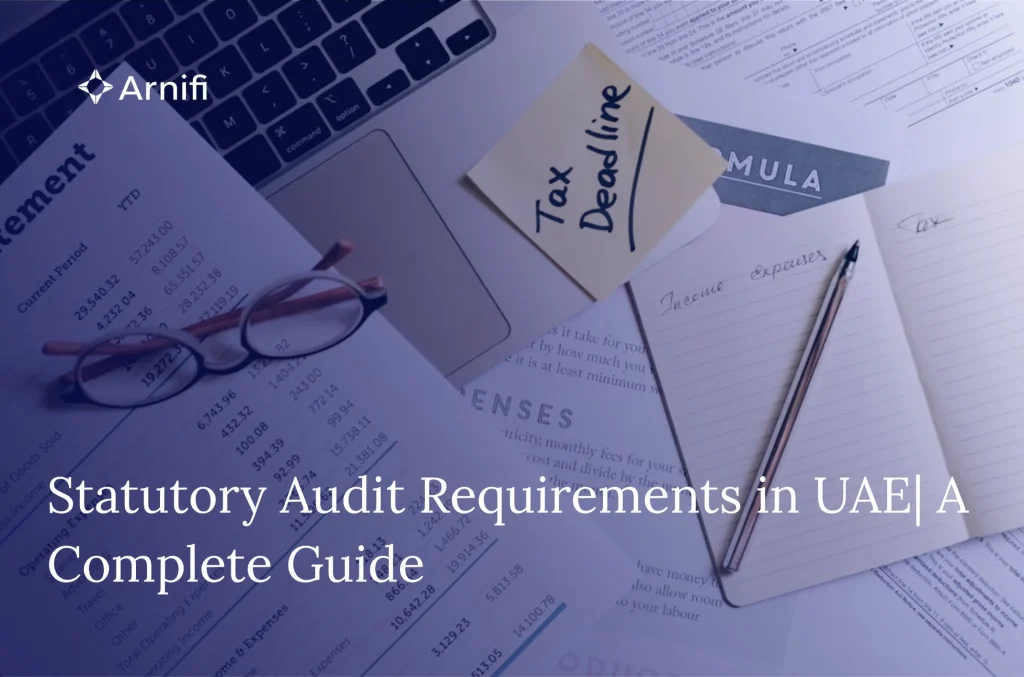Statutory Audit Requirements in UAE| A Complete Guide
by Rifa S Laskar Oct 27, 2025  4 MIN READ
4 MIN READ

Statutory audit requirements in UAE are crucial for any company operating in Dubai or the wider UAE. Whether you run an LLC, Pvt or a branch of a foreign company, the rules differ slightly. Here’s a clear, step-by-step guide on eligibility, process, documents & cost.
Table of contents
1. Introduction
If you’re running a business in the UAE, you must comply with the statutory audit requirements in UAE. These audits aren’t just formalities; they ensure transparency, accuracy & trust in your financial statements. Here, the thing is that statutory audits are different from regular internal or management audits. What this really means is that the government, regulators & stakeholders rely on them to make decisions and monitor compliance. Let’s break it down.
2. What is a Statutory Audit?
A statutory audit is a legally mandated examination of a company’s financial statements. It is designed to verify the accuracy and completeness of accounting records. This ensures that shareholders, authorities & other stakeholders can trust the financial data.
Unlike regular audits, which are optional or internal, statutory audits are required by UAE law for almost all business types, particularly those operating in free zones or with multiple shareholders.
Key Points:
- Conducted by independent statutory auditors.
- Required for LLCs, private companies, branches of foreign companies & public sector entities.
- Usually elected by shareholders for a term of 3-5 years.
- Ensures compliance with UAE regulations, including VAT and free zone authorities.
3. Eligibility for Statutory Audit in UAE
Not every business in the UAE must undergo a statutory audit, but here’s a clear overview:
| Company Type | Statutory Audit Required? | Notes |
| LLC (Limited Liability Company) | Yes | Mandatory for all with multiple shareholders. |
| Pvt Limited Company | Yes | Required before annual license renewal. |
| Free Zone Company | Yes | Most free zones demand audited reports annually. |
| Branch of Foreign Company | Yes | Annual submission of audited reports to authorities. |
| Small Sole Proprietorship | No | Usually exempt unless requested by investors or banks. |
4. Steps to Conduct a Statutory Audit
Here’s a simplified process for statutory audit requirements in UAE:
- Appoint an independent statutory auditor.
- Gather all financial records this includes bank statements, invoices & receipts.
- Provide details of fixed assets, inventory & company transactions.
- Prepare documentation of statutory dues, local and import purchases, loans & advances.
- Auditor reviews and examines all documents.
- Auditor prepares a report confirming accuracy and compliance.
- Submit audited report to shareholders, banks & regulatory authorities.
5. Documents Required
Auditors need the following documents to complete a statutory audit in UAE:
- Bank statements and transaction details
- Inventory reports
- Records of all company transactions
- Loan, credit & advance details
- Employee salaries and overhead costs
- Profit, losses, and other financial statements
- Statutory dues and other obligations
6. Cost of Statutory Audit
| Company Size | Estimated Cost (AED) | Notes |
| Small Pvt / LLC | 10,000 – 15,000 | Basic review of financial statements |
| Medium Company | 20,000 – 35,000 | Includes verification of inventory and assets |
| Large / Multiple Shareholders | 40,000 – 60,000 | Comprehensive audit for multi-branch operations |
Costs may vary depending on company size, complexity, and volume of transactions.
7. How Statutory Audit Differs from Regular Audits
Here’s why statutory audits are different:
- Legally required vs. optional internal audits
- Focuses on compliance and transparency rather than operational efficiency
- Conducted by independent auditors
- Essential for license renewal, bank loans & investor assurance
8. FAQs
Q1: Are all companies in UAE required to do a statutory audit?
A1: Most LLCs, Pvt companies, free zone entities, and foreign branches must comply, while small sole proprietorships may be exempt.
Q2: How often should statutory audits be conducted?
A2: Annually, before license renewal or submission to shareholders and authorities.
Q3: Who can conduct statutory audits?
A3: Only independent auditors registered with UAE authorities can conduct statutory audits.
Q4: Can banks request audited statements?
A4: Yes, banks often require audited statements before approving loans or releasing capital.
9. Conclusion
Complying with Statutory Audit requirements in UAE isn’t optional it’s crucial for transparency, legal compliance & investor confidence. Beyond audits, Arnifi helps companies with bookkeeping, accounting, tax services, VAT services & company setup support.
If you’re planning your next statutory audit in Dubai or elsewhere in the UAE, our team can guide you through the process efficiently this ensures accuracy and compliance.
Top UAE Packages

Related Articles
Top UAE Packages



